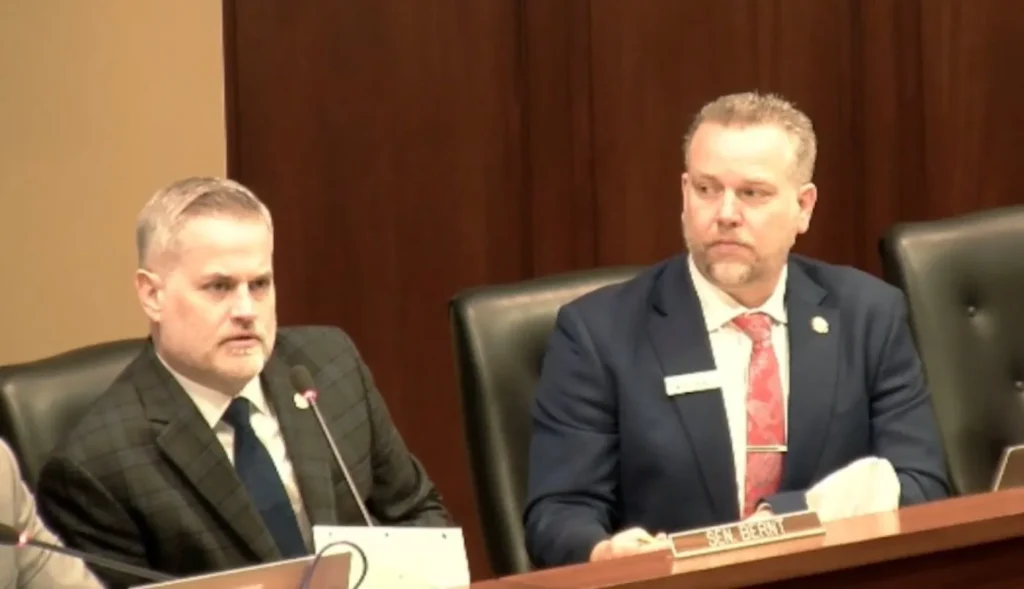This morning I watched the debate in Senate State Affairs over whether or not public money should be used for gender transitions. Most of the people who signed up to testify opposed the bill, believing that Medicaid and other welfare programs should cover counseling, hormones, and even surgery to alter a person’s sexual characteristics.
One statement jumped out at me. Sen. Melissa Wintrow, the leader of Senate Democrats, said that Medicaid covered treatment for erectile dysfunction, and said that was the same sort of “gender affirming care” as these people who identify as transgender seek. Last week, testifying against the same bill, Mistie Dellicarpini-Tolman of Planned Parenthood Action said that her breast cancer treatment was “gender affirming care”.
Notice how quickly the left adopted new definitions with regards to this issue. This idea — that taking cross-sex hormones or mutilating healthy tissue so as to alter one’s body to fit a view of oneself twisted by mental illness is the same as restoring the form and function of body parts damaged by disease — would have been rightfully considered ridiculous up until just a few years ago. Yet here we are.
I’ve no doubt that Sen. Wintrow and Ms. Dellicarpini-Tolman consider themselves progressive, which means staying on the cutting edge of societal changes. Affirming a person’s desire to undertake drugs and surgeries, altering their body to fit their self-image, is considered progressive and tolerant today, and anyone who opposes it are simply bigoted and mean.
I doubt either woman would support weight loss surgery for anorexics, because that is surely somehow different.
In any case, the debate this morning was not really about how far we should go in allowing public funds to be used for various medical procedures. It was rather about foundational beliefs about the nature of reality and the human condition: Can a human being change his or her sex through drugs and surgeries?
If your first principles are that they can, that sex and gender are malleable, then your belief that Medicaid should cover those procedures will naturally follow.
On the other hand, if your first principles say that men are men, women are women, and there’s no in between, then of course you’re not going to support using tax dollars to allow confused people to harm themselves.
This is in addition, of course, to first principles regarding whether or not taxpayers should be paying for medical bills in the first place.
A first principle is an assumption about the nature of the world that is not based upon any other assumptions. We do not need scientific papers or research to know that men are men and women are women, rather is is a foundational truth that all people once agreed was self evident. Yet today’s society is obsessed with deconstructing everything we once believed, so simple truths like that are called into doubt.

If you are not firmly grounded in foundational principles then you will find yourself persuaded by emotional testimony on every issue, like a leaf in the wind being blown this way and that. While all of us should be humble enough to allow our minds to be changed, we must also ground ourselves in first principles and see the debate from that perspective.
I was struck during this morning’s debate by the fact that nobody had any doubt about how the Democrats were going to vote on this bill. They are fairly up front with their first principles — they generally support expanding government welfare, and they believe that sex and gender are malleable characteristics.
However, I could not predict how the Republicans would vote, and I think that’s a problem. What are Sen. Jim Guthrie’s first principles regarding sex and gender? What are Sen. Treg Bernt’s? The latter voted against H71 last year, which banned gender mutilation surgeries for minors in Idaho, and he seemed moved by the testimony of a transgender individual this morning. To his credit, he voted in favor of today’s bill, while Chairman Guthrie voted against it.

First principles have to be more than just nebulous statements about liberty which are vague enough to be interpreted any possible way. That is how we get Republicans like Gov. Brad Little vetoing a bill to prevent businesses from requiring Covid shots because he believes government should not interfere with private enterprise and former Arkansas Gov. Asa Hutchinson vetoing a bill to ban child gender mutilation because it gets between families and their doctors.
As you prepare to vote in this year’s primary election, make sure you know where each candidate stands. What are the foundational principles that they will use when deciding how to vote on important issues? Don’t let them get away with mere platitudes — nail them down. If someone goes to the Capitol without clear cut first principles, they will be easy pickings for activists and lobbyists with emotional narratives and lots of cash.
Paid subscribers, head over to Substack for a bonus note. Not subscribed? Click here to sign up!
About Brian Almon
Brian Almon is the Editor of the Gem State Chronicle. He also serves as Chairman of the District 14 Republican Party and is a trustee of the Eagle Public Library Board. He lives with his wife and five children in Eagle.












